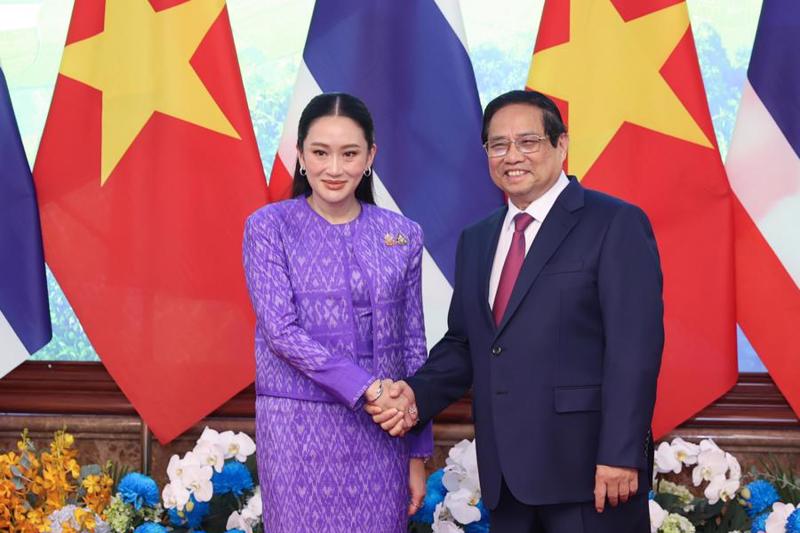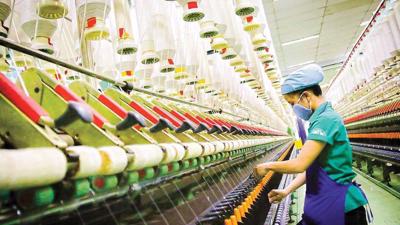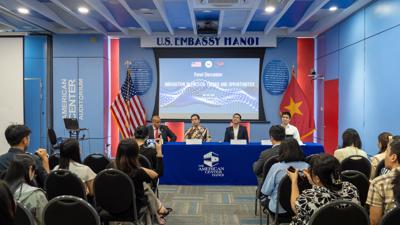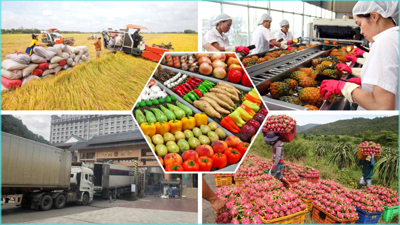Ever-closer partnership between Vietnam and Thailand
Government and business leaders from Vietnam and Thailand attending a recent forum in Hanoi emphasized the need to strengthen economic ties through digital transformation, sustainable development, and deeper regional integration.

Addressing the “Vietnam - Thailand Business Forum 2025”, which he co-chaired with his Thai counterpart Paetongtarn Shinawatra on May 15 in Hanoi, Prime Minister Pham Minh Chinh stressed that, in the current global economic context, while Vietnam, Thailand, and other ASEAN countries have established solid cooperation there remains a pressing need to strengthen this collaboration further, making it more effective, more impactful, and more inclusive. The ultimate goal is to deliver tangible benefits to the people of both countries, ensuring that no one is left behind in the process of regional development and integration.
Leaders and business representatives from both countries agreed that to progress towards becoming developed economies, Vietnam and Thailand must boost cooperation in three key areas: strengthening supply chain links in mutually-beneficial sectors, fostering closer collaboration between businesses and localities, and aligning strategies for sustainable, long-term growth.
Unquestionable truth
In the process of building cooperative relations between the two countries, the need to adopt innovations and technologies, such as smart infrastructure that incorporates digitalization, to develop the three strategic connections has become indisputable.
Today, innovations and technologies are driving forces behind every corporate success. As such, both countries and their businesses alike face a clear choice: either embrace innovation and technology or be disrupted by them, according to Mr. Krailuck Asawachatroj, Chief Strategic Officer at logistics provider the WHA Corporation PCL.
As a logistics company with 85 per cent of its clientele being foreign businesses, WHA has clearly recognized the benefits of integrating digital applications into logistics operations to enhance customer service. With 40 digital transformation projects, including 12 initiatives leveraging AI models implemented across its facilities in both Vietnam and Thailand, Mr. Asawachatroj affirmed that the effectiveness of digital innovation is indisputable, especially as many clients consistently demand maximum efficiency while maintaining sustainability.
Thanks to the large-scale adoption of smart infrastructure through smart industrial real estate projects powered by renewable energy in Thailand, the company has successfully attracted a growing number of foreign investors. These models are also set to be implemented at WHA’s facilities in Vietnam, promising to attract additional foreign capital in the near future.
Mr. Ton Chirathivat, Chief Digital Officer at Central Retail Vietnam, told the gathering that smart infrastructure should not only be applied at an industrial scale or by large corporations but also serve as a powerful driver of cross-border trade between small businesses in both countries. From providing online trading platforms to optimizing warehouse management and goods transportation, smart infrastructure is helping small and medium-sized enterprises (SMEs) in both Vietnam and Thailand expand their reach, not just within the two countries but also into international markets.
Smart infrastructure also plays an essential role in supporting outsourced production, including software development. This has become increasingly common in recent years, especially as Vietnam boasts a highly-skilled pool of IT engineers capable of handling complex projects for foreign enterprises.
Chokehold on future investments
Despite the seamless flow of goods, services, and even people on a large scale between the two countries, Mr. Chat Luangapra, Executive Vice President of KBank, noted that data exchange remains a largely untapped channel. In a context where a significant volume of domestic transactions in Vietnam and Thailand are now conducted on digital platforms, establishing data-sharing infrastructure between the two has become essential to unlocking the full potential of bilateral financial activities.
He emphasized that shared digital platforms, particularly for financial data, would serve as a catalyst for elevating cross-border trade, tourism, and broader economic cooperation between Thailand and Vietnam to a new level of integration and efficiency.
In addition to the absence of cross-border financial data and payment exchange channels, Thai businesses have pointed out that Vietnam’s energy shortage could become a critical barrier to bilateral cooperation and may undermine the country’s appeal among foreign investors in the future.
Mr. Jormsup Lochaya, CEO of the Super Energy Corporation, noted that after investing $1.3 billion in Vietnam’s renewable energy sector over the past eight years, his company has recently encountered challenges due to unclear regulations and administrative procedures in the energy sector. “For FDI to continue flowing into Vietnam, the most essential factor is a stable and abundant supply of renewable energy,” he stressed. He also reaffirmed his strong confidence in Vietnam’s energy market, revealing that the company is preparing to shortly launch two new renewable energy projects worth a combined $300 million.
Deputy Minister of Finance Nguyen Thi Bich Ngoc, meanwhile, said that in order to further promote two-way investment cooperation between Vietnam and Thailand, the Ministry will propose the consistent implementation of new strategies and commitments agreed upon by both countries. A key priority will be the early establishment of a joint working group to coordinate infrastructure connectivity and supply chain integration. Strategic and sustainable development links must also be emphasized, especially through the promotion of bio, circular, and green economic models.
She emphasized that the Vietnamese Government remains committed to standing alongside the Thai business community and is ready to listen and engage in timely dialogue. For issues that fall beyond the Ministry’s authority, reports will be submitted to the Prime Minister for further consideration and resolution.
After 12 years of a Strategic Partnership, the relationship between Vietnam and Thailand has officially been elevated to a Comprehensive Strategic Partnership, emphasizing several key pillars: sustainable stability, sustainable development, and a sustainable future. This upgraded partnership is not bound by limits but driven by the shared goals of peace, cooperation, development, independence, freedom, and the well-being of both peoples.
In the current context of increasing global complexity, unpredictability, and challenges that no single country can address alone, collaboration has never been more essential. Previously, no individual country was able to contain the Covid-19 pandemic on its own. Similarly, no single nation can resolve the global issues of today, such as climate change, dwindling natural resources, and aging populations by itself. Vietnam, Thailand, and other ASEAN members must strengthen unity in diversity and deepen cooperation. While Vietnam and Thailand have already built a solid foundation of collaboration, now is the time to make that partnership stronger, more efficient, and more impactful.
Thai businesses are currently facing several challenges in Vietnam. The first relates to taxation, which the Vietnamese Government is actively addressing. The second involves projects in the energy sector, and the third concerns administrative procedures.
Vietnam is undertaking transformative efforts, notably in administrative reform and the restructuring of administrative boundaries. These initiatives aim to streamline bureaucratic processes, reduce intermediaries, and directly tackle the longstanding concerns of investors and businesses. The government is determined to cut 30 per cent of administrative procedures and associated costs this year.
Furthermore, Vietnam is shifting from a reactive to a proactive approach, moving from passively receiving and handling issues to actively resolving them for businesses and the public. The country remains firmly committed to protecting the legitimate rights and interests of enterprises and ensuring optimal conditions for their operations. Vietnam is ready to listen to, share, and collaborate with the business community in a spirit of joint effort, shared benefits, and mutual success."
Prime Minister Pham Minh Chinh
A key focus moving forward is the swift promotion of value chain connectivity between the two economies, aiming to fully leverage each country’s strengths and strategic priorities. As the two largest economies in the Greater Mekong Subregion, Thailand and Vietnam play a pivotal role in driving ASEAN’s economic growth.
The two economies are closely interlinked, with many enterprises participating in the same value chains. More than 50 per cent of Vietnam - Thailand trade involves the import and export of raw materials and components that support domestic manufacturing and export activities. As such, economic growth in one country presents a valuable opportunity for the other.
To promote mutual economic growth, it is essential to establish stronger supply chain links between the two countries, particularly in key sectors such as petrochemicals, electronic components, and logistics. These connections should also involve developing human resources for future industries like AI and semiconductors. Local economic integration should also be further advanced, especially between Thailand’s northeastern region and Vietnam’s central provinces, through collaboration between more than 20 partner cities. This would help expand investment, trade, and tourism opportunities for local entrepreneurs.
The two countries must also prioritize cooperation in sustainable development and digital transformation. Currently, more than two-thirds of Thailand’s investment in Vietnam is directed towards renewable energy projects. The Comprehensive Strategic Partnership goes beyond government-level cooperation and includes the private sectors of both countries. In fact, the private sector is the key driver in realizing the full potential of all areas of cooperation identified by both governments."
Prime Minister Paetongtarn Shinawatra
Thailand is currently Vietnam’s largest trading partner within ASEAN, with bilateral trade reaching over $20 billion in 2024. Thai investors have launched 767 projects in Vietnam, totaling nearly $15 billion in registered capital, ranking it ninth among 150 countries and territories. Vietnam, meanwhile, has invested in 22 projects in Thailand, with total capital of nearly $35 million.







